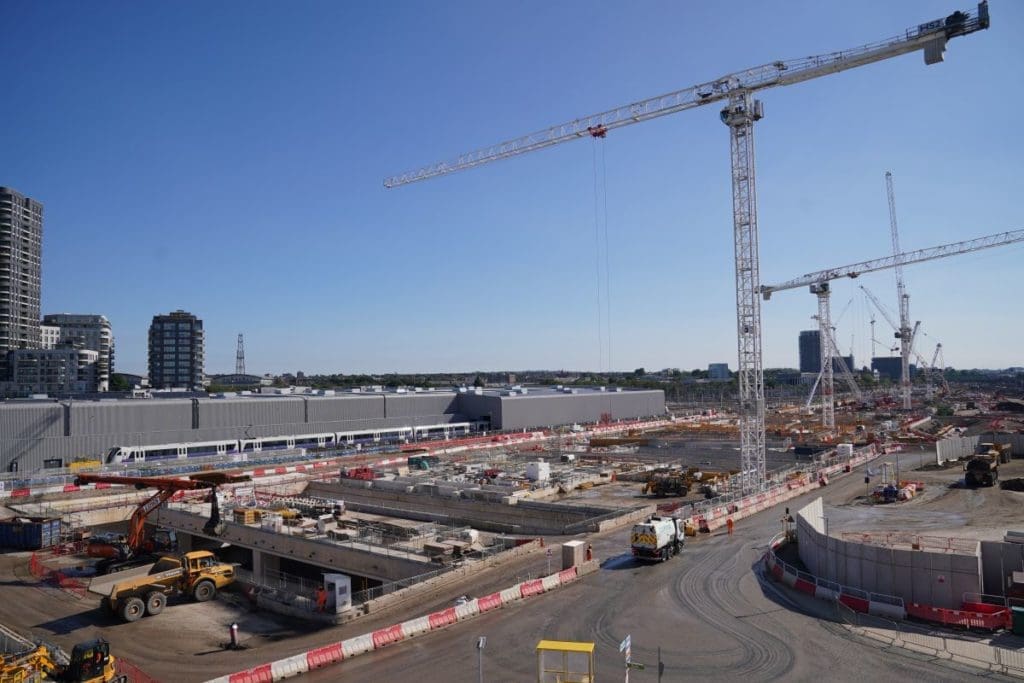HS2’s west London station has been awarded an outstanding score for its environmental design.

Old Oak Common, which is under construction, was given the highest possible rating under an international scheme.
It is among just 1% of new buildings globally to achieve the highest mark under the Building Research Establishment’s Environmental Assessment Method (Breeam).
HS2 Ltd said Old Oak Common’s design team “pursued and met multiple areas of best practice”.
The station design was credited for responsible construction practices, waste management and the adaptation of the building to climate change.
The rating recognises that the station will deliver net zero emissions and require minimal or no grid-supplied energy when in use.
Elements of its design which will enable this to happen include solar panels on its roof, an open plan layout allowing for natural ventilation, and daylight sensors that reduce demand for artificial light.
Rainwater harvesting at the station is expected to cover 100% of water required for urinal and toilet flushing.
A conveyor system is being used to remove large volumes of excavated materials, reducing the need for lorries.
HS2 Ltd has a commitment to waste efficiency during construction of the station, with 95% of site materials being sent away for “beneficial use”.
However, the project’s impact on the environment has been criticised elsewhere.
In February, the Wildlife Trusts accused the company of using an accounting tool that is “untested, out of date and fundamentally flawed” to assess its impact on nature.
It published a report claiming there will be “at least 17% less nature present” after construction of Phase One between London and Birmingham, whereas HS2 Ltd “say there will only be a 2.6% nature loss”.
Phase 2a between the West Midlands and Crewe will result in a 42% nature loss, compared with HS2 Ltd’s prediction of 17%, the document stated.
HS2 Ltd said it did not believe the Wildlife Trusts’ figures were “reliable”.
Huw Edwards, HS2 Ltd’s project client for Old Oak Common, said long-term sustainability is a “prime consideration” for the high-speed railway.
Speaking from the work site, he told the PA news agency: “We’ve achieved the highest level possible (within Breeam).
“That’s through thinking diligently through our design and understanding what it’s going to mean to operate the facility and how can we operate it sustainably.
“I’m hugely proud that we’ve been recognised through that award for how we’ve designed and how we’re building (the station), but what gives me much more pride is it means when we operate this facility, it’ll be operated sustainably.”
He added: “The most effective way to cut transport carbon emissions in the UK and improve our air quality is to invest in rail, including HS2.
“HS2 will help the UK’s fight against climate change and the drive to reach net zero carbon emissions.”
Old Oak Common will be the UK’s largest newly built railway station.
It is scheduled to open between 2029 and 2033.
The pausing of HS2 work at Euston means Old Oak Common will be the high-speed railway’s only London station when services to and from Birmingham begin.
Passengers travelling to and from central London will need to take Elizabeth line services.
A budget of £55.7 billion for the whole HS2 project was set in 2015.
But the target cost excluding the eastern leg of Phase 2b from the West Midlands to the East Midlands has soared to between £53 billion and £61 billion (at 2019 prices).
Asked about progress at Old Oak Common, Mr Edwards said: “We’re doing well against time and budget.
“We’re struggling in some areas, as you can imagine, so we’re adding some resources, but in other parts of the scheme actually we’re ahead of the programme.”


